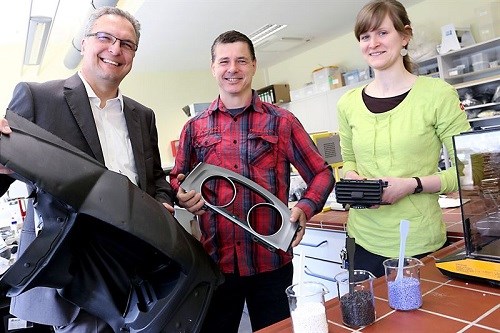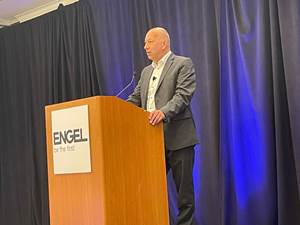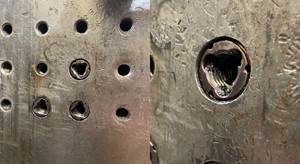Recycling of Plastic Auto Parts Gains Attention in Early Stages
SPI launches automotive recycling report; separation process key to German start-up’s patented recycling technology.
SPI launches automotive recycling report; separation process key to German start-up’s patented recycling technology.
There is a buzz about automotive plastics recycling these days, and I’ll bet that in the not-so-distant future we will hear about some of the advances being made. Last week I blogged about MBA Polymers starting up what appears to be the first production of PC/ABS pellets derived from shredded WEEE (waste electrical and electronic equipment).
But the company’s claim-to-fame is its now five-year-old Workshop, U.K. plant, which is reportedly the world’s largest (annual production capacity of up to 176 million lb) and most advanced facility for recovering plastics and rubber from automotive shredder residue. Its proprietary processes reportedly use less than 20% of the energy needed to produce virgin resins.
In a bit of serendipity, other news on this front emerged last week:
• SPI released its new report, Automotive Recycling: Devalued is now Revalued, which highlights innovative use of recycled content and achievements in zero waste in manufacturing, as well as promoting increased recycling of plastic automotive parts. At the same time, SPI noted the while automotive recycling is leading other industries—with 95% of automobiles recycled at the end of their practical life, the recycling of plastic materials in automobiles, is in its infancy.
SPI sees abundant opportunities for recycled plastic in cars. Each year in the U.S., about 12-15 million vehicles are scrapped with more and more plastic components and parts comprising an ever increasing amount of those vehicles. “There is an opportunity for recycled plastics in the automotive sector, and we are hoping to merge key learnings from all members of the supply chain together to learn how we can best promote and grow plastics recycling in the automotive industry,” said Kim Holmes, SPI’s senior director of recycling and diversion.
To help close the loop in automotive plastics, SPI has two projects underway. First, is the Zero Net Waste (ZNW) recognition program, which assists the plastics industry in managing waste in manufacturing by offering specific tools to evaluate waste reduction opportunities and maximize landfill diversion.
Second, in a separate recovery effort, SPI members have begun a collaborative research project to explore the viability of collecting and recycling auto plastics from end-of-life vehicles and build a basic recovery model for whole parts before shredding. The review will help determine the feasibility of recovery today pared against material performance and demand for recycled PP and TPO. If successful, the project will serve as a launching point to explore the opportunity to recover additional plastics, both through whole-parts recovery and eventually auto shredder residue (ASR).
• The engineering and technical center PulverMetallurgische Kompetenz-Centrum Thale (PMC), located in the German federal state Saxony-Anhalt and globally respected for its expertise in powder metallurgy, is expanding its work to encompass the recycling of automotive plastic waste into high-quality material. Each month, Volkswagen which is among PMC’s development partners, has been bringing two to three containers of plastic waste to the PMC, according to Thomas Kock, PMC’s managing director. He adds that there is great industrial demand for production processes that save energy and material, especially in the automotive and aviation industries. Pointing out that automotive plastic waste is costly and adversely affects the environment, Kock notes: “from our experimental factory, visions take shape and set off out into the world.”
Today, at PMC’s “experimental factory”, you can find sacks filled with granulate derived from shredded and ground plastic automotive waste. Kock says, the technology involved is ground-breaking, noting that this granulate can be used again without a decrease in quality, compared to most plastics which are thermally recycled or recycled in an inferior way which causes a drop in the material’s quality.
A team led by inventor Jorg Beckmann developed new processing procedures at the PMC with which it is reportedly possible for the first time to add prepared plastic wastes to fresh mixtures that are almost 100% new. Last year, this patented invention was awarded the Hugo Junkers Prize for Research and Innovation from Saxony-Anhalt. Chemical lab assistant Nicole Mahnke and chemical engineer Jurgen Deinert are key to this project, and are now part of the recently founded start-up company Seco Thale GmbH, which is one of PMC’s tenants. “Our tests are now going beyond the standard for laboratories,” says Deinert, noting that the internally developed processing line in the experimental factory acts as a technical center for further optimizing processes and end products.
It turns out that the heart of this invention is the separating process. Whether it be dashboards, surrounds or ventilator blades—different plastics are always processed. So far, PP, PUR and PVC have been separated from each other by means of the new technology.
The granules are of different color—black, white, blue, depending on the initial product or they are colored before they are made into new injection molded parts, according to Mahnke. In addition to the patented separation technology, new testing and measuring systems have advanced this research by confirming the high quality of the resultant recycled automotive plastics.

Related Content
Getting Charged Up About Electric Vehicles
Metal-to-plastics replacement stories are a classic of the genre for plastics publishing, and nowhere more so than in the automotive space.
Read MoreSPE Automotive Awards Applaud ‘Firsts’ and Emerging Technologies
The 51st annual SPE Automotive Innovation awards gave nods to several ‘firsts’ and added alternative vehicle systems category.
Read MoreABC Technologies to Acquire Windsor Mold Group Technologies
The Tier One automotive supplier with compounding and blowmolding machine capabilities adds the 50-yr-old molder and moldmaker.
Read MoreMolder Repairs Platen Holes with Threaded Inserts
Automotive molder ITW Deltar Fasteners found new life for the battered bolt holes on its machine platens with a solution that’s designed to last.
Read MoreRead Next
How Polymer Melts in Single-Screw Extruders
Understanding how polymer melts in a single-screw extruder could help you optimize your screw design to eliminate defect-causing solid polymer fragments.
Read MorePeople 4.0 – How to Get Buy-In from Your Staff for Industry 4.0 Systems
Implementing a production monitoring system as the foundation of a ‘smart factory’ is about integrating people with new technology as much as it is about integrating machines and computers. Here are tips from a company that has gone through the process.
Read MoreAdvanced Recycling: Beyond Pyrolysis
Consumer-product brand owners increasingly see advanced chemical recycling as a necessary complement to mechanical recycling if they are to meet ambitious goals for a circular economy in the next decade. Dozens of technology providers are developing new technologies to overcome the limitations of existing pyrolysis methods and to commercialize various alternative approaches to chemical recycling of plastics.
Read More


























